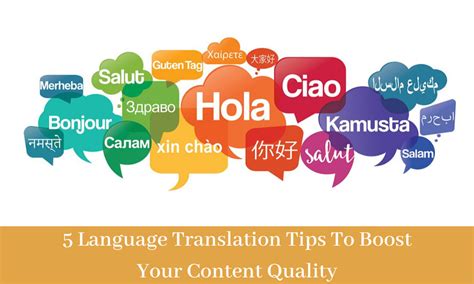In today's interconnected world, language barriers are becoming increasingly irrelevant, thanks to advancements in technology. The translation services industry has witnessed a significant transformation with the integration of cutting-edge technologies, enabling faster, more accurate, and cost-effective language solutions. This article explores the five primary ways in which technology has revolutionized translation services, making it an indispensable tool for global communication.
The Rise of Machine Translation
The Rise of Machine Translation

Machine Translation (MT) has emerged as a game-changer in the translation services industry. This technology uses algorithms and artificial intelligence to translate text from one language to another. While MT is not yet perfect, it has improved significantly over the years, offering numerous benefits, including:
- Speed: MT can translate vast amounts of text in a fraction of the time it would take a human translator.
- Cost-effectiveness: MT is often more affordable than human translation, making it an attractive option for businesses and individuals with limited budgets.
- Consistency: MT ensures consistency in terminology and style, which is particularly important for large-scale translation projects.
Advancements in Translation Memory
Advancements in Translation Memory

Translation Memory (TM) is a database that stores previously translated content, allowing translators to reuse and leverage existing translations. This technology has undergone significant advancements, including:
- Fuzzy matching: TM algorithms can identify similar phrases and sentences, enabling translators to reuse existing translations and reduce costs.
- Real-time updates: TM databases can be updated in real-time, ensuring that translators have access to the most recent translations.
- Collaboration tools: TM software often includes collaboration features, enabling multiple translators to work together on large-scale projects.
The Impact of Artificial Intelligence
The Impact of Artificial Intelligence

Artificial Intelligence (AI) has revolutionized the translation services industry, enabling more accurate and efficient translations. AI-powered tools can:
- Analyze context: AI algorithms can analyze the context of a text, enabling more accurate translations.
- Identify nuances: AI-powered tools can identify nuances in language, such as idioms and colloquialisms.
- Learn from feedback: AI algorithms can learn from feedback, enabling them to improve their performance over time.
The Role of Cloud-Based Translation Platforms
The Role of Cloud-Based Translation Platforms

Cloud-based translation platforms have transformed the way translation services are delivered. These platforms offer:
- Scalability: Cloud-based platforms can handle large-scale translation projects with ease.
- Accessibility: Cloud-based platforms enable translators to work from anywhere, at any time.
- Collaboration tools: Cloud-based platforms often include collaboration features, enabling multiple translators to work together on projects.
The Future of Translation Services
The Future of Translation Services

As technology continues to evolve, the translation services industry is likely to undergo further transformation. Some potential future developments include:
- Increased use of AI: AI is likely to play an even more significant role in translation services, enabling more accurate and efficient translations.
- Integration with emerging technologies: Translation services may be integrated with emerging technologies, such as blockchain and the Internet of Things (IoT).
- Greater focus on localization: As businesses expand globally, there may be a greater focus on localization, enabling companies to tailor their products and services to specific markets.
Gallery of Translation Technologies:






FAQs:
What is machine translation?
+Machine translation is a technology that uses algorithms and artificial intelligence to translate text from one language to another.
What is translation memory?
+Translation memory is a database that stores previously translated content, allowing translators to reuse and leverage existing translations.
How does artificial intelligence impact translation services?
+Artificial intelligence enables more accurate and efficient translations, analyzes context, identifies nuances in language, and learns from feedback.
In conclusion, technology has revolutionized the translation services industry, enabling faster, more accurate, and cost-effective language solutions. As technology continues to evolve, it's likely that the translation services industry will undergo further transformation, with increased use of AI, integration with emerging technologies, and a greater focus on localization.
